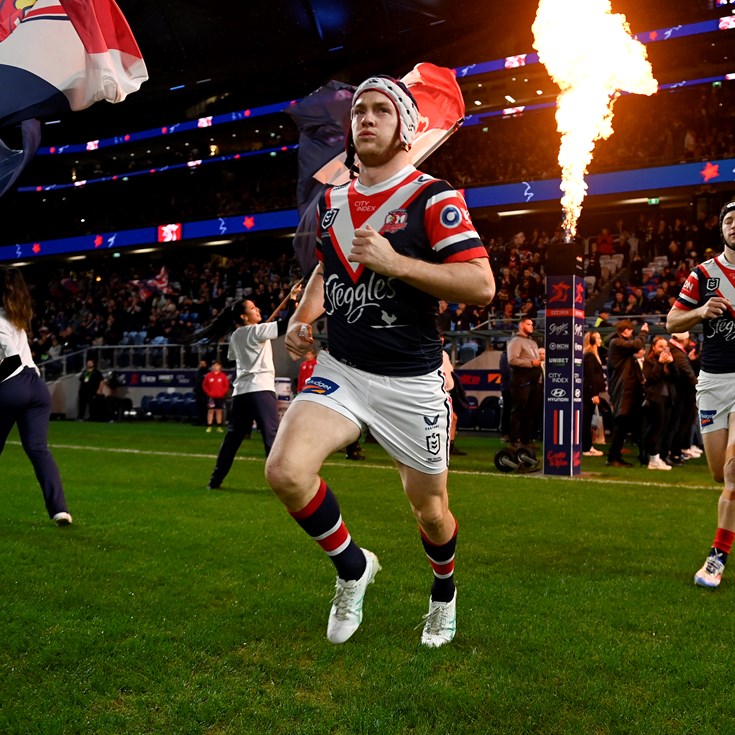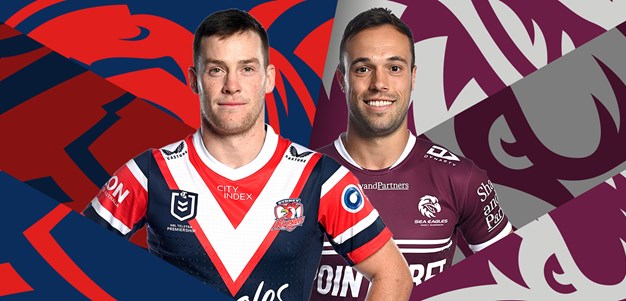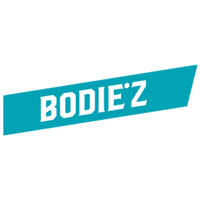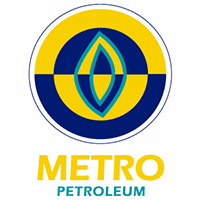On the day Travis Touma finished Year 12 at Lewisham’s Christian Brothers High, his uncle Ghillar Michael Anderson drove him to Goodooga in north-west NSW to learn about his Indigenous ancestry, culture and relationship with the land.
Touma, who is best known to many fans as the Sydney Roosters trainer controversially struck by the ball in last year’s grand final, is the only Indigenous person currently in a senior coaching or training role at NRL level.
Like his famous uncle, who was Terry Randall’s centre partner in the lower grades for Manly before co-founding the Aboriginal Tent Embassy in Canberra in 1972, Touma wants to use his profile as head of performance for the back-to-back premiers to influence change.
“I want to have more of a presence in and around educational organisations to promote the fact that the position I have achieved at the Roosters, and in the game, is there for anyone to grab hold of if they are willing to put in the work,” Touma said.
With his father Assad born in Lebanon and his mother Pam being a Euahlayi woman, Touma is proud of both cultures and he represented the Cedars at the 2000 World Cup in a side which featured Arthur Beetson – the first Aboriginal to captain a major Australian sporting team – on the coaching staff.
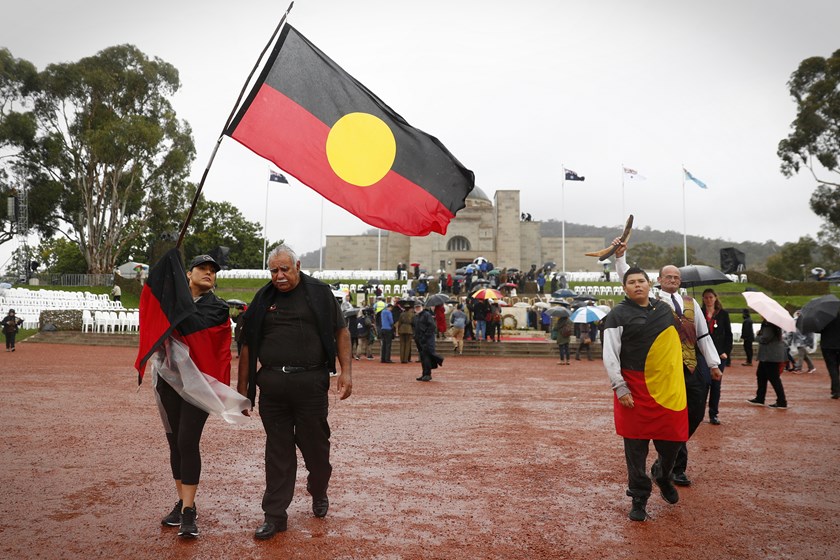
However, Touma quit playing to focus on his studies to become a physiotherapist and after volunteering with the Newtown Jets team that made the 2008 NSW Cup grand final, he has worked his way through the ranks at the Roosters.
“In communities where I am known, which is pretty wide, a lot of people say ‘that baldy headed fellow running around in the orange shirt for the Roosters, that is Ghillar’s nephew’,” Anderson said.
“A lot of Aboriginal people know of my background so that connects him back to the community right throughout Australia who are watching rugby league now and in his own right he is a representative of the Aboriginal community on a broader scale because he is there at that level.
“Aboriginal people are very proud of the fact that we have someone in such a position.”
Anderson, who is the leader of the Euahlayi people, has had a significant influence on Touma since he was young and ensured he learned about Aboriginal culture and politics.
“When I finished Year 12 my uncle drove down from Goodooga, picked me up, threw me in the back of the ute and took me up there for three or four weeks,” Touma said.
“He wanted to make sure I spent some time out on the land – on the property where the family is from – and he was talking through the stories of ancestors and the Dreaming and all of that sort of stuff.”
He also took Touma to Walgett, where his mother lived until she was 13 after the family relocated from Goodooga when Anderson began high school.
“Travis came from very humble beginnings," said Anderson, who played for Newtown and Wynnum-Manly.
"All the mob out west at Walgett, Goodooga, Lighting Ridge and all of those places, they know him and they know that his mother grew up on riverbanks in tin shacks with no running water and dirt floors, but look where he is now.
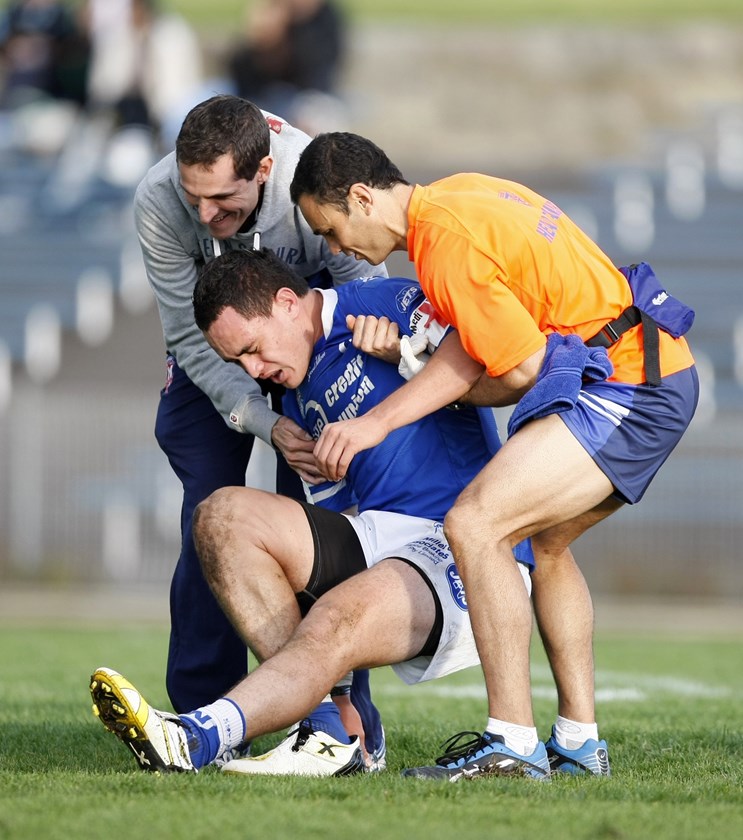
“I made sure that they all know. We took him down and showed him where the tin shacks were on the bank of the river where we grew up with no running water. Then we showed him Walgett. We lived on the riverbank there in tin shacks.
“You scrape up whatever iron was around and you build a shack out of it but we had a community that was very strong at Walgett, and they were a family.
“That family made sure that we children did not understand what poverty was back then. If you measure poverty on the basis of being able to survive, we survived. But if you are basing it on material wealth then we had absolutely nothing.”
Clive Churchill Medal
Touma jokes that he has won a Clive Churchill Medal, as well as three NRL premiership rings with the Roosters – a reference to his role in last year’s 12-8 grand final triumph against the Raiders.
“Someone cheekily put that in my Wikipedia profile,” he said.
Newtown were a feeder team to the Roosters in 2008 and when leading physiotherapist Tony Ayoub left the club at the end of the season Touma was approached by trainer Ron Palmer and doctor John Orchard to take his place on Brad Fittler’s staff.
A Roosters fan despite playing SG Ball for South Sydney, Touma jumped at the chance and he has now been with the club for 12 seasons.
“At the end of the 2013 season Trent Robinson offered me the Head of Performance role and I have been doing that ever since,” Touma said “I oversee the physical program at the Roosters – the medical program, strength and conditioning, nutrition and all of those things.
“Everything that goes into their physical preparation on and off the field, I oversee – the strength programs, the running programs, the speed programs and everything that goes into that.”
Indigenous players comprise 11 per cent of NRL playing stocks but few have taken on coaching or training roles at the elite level after they retire.
Beetson coached the Roosters and Sharks, Laurie Daley was on the St George Illawarra staff under Nathan Brown and has coached NSW, Justin Hodges has been involved with Queensland and Greg Inglis had a development role at Souths before deciding to play again in England next season.
Asked if he knew of any other First Nations people in senior coaching or training jobs with NRL clubs, Touma said: “Unfortunately no I don’t”.
Match Highlights: Roosters v Raiders
Role model
With the urging of his mother and wife, Marie, Touma wants to encourage Indigenous players to pursue careers in the game after their playing days finish.
Each Easter, the family travel to Goodooga, where Anderson runs a successful sheep farm, and his children are taught about culture and Dreamtime stories.
Touma is usually unable to join them because of his commitments with the Roosters but it has led to discussions about how he can do more.
“My wife comes back and she has been talking Dreamtime stories, and stories about the family on the land where my mum’s mob is from, and she is always getting into me about what more I should be doing to benefit our culture,” he said.
“I cop it a little bit from my mum too about my background and the position I do hold at the Roosters, and how important that is for younger Aboriginal people – male and female – to know that.
“We place a lot of value in the actual sport, we all know about Latrell Mitchell, Blake Ferguson and Connor Watson, and all those guys who get to run out and do their thing for 80 minutes every week but there are so many opportunities for people to get involved and to have an impact on a sport we love away from the game.
“Those guys perform for 80 minutes but there is 40 or 60 or 80 hours per week to help them prepare. There is a lot of value in that and there should be a lot of pride that people place on that and aspire to achieve if given the opportunity like I was.
“They are phenomenal athletes, they are highly intelligent rugby league players and it would be fantastic to see those guys in and around coaching when their careers finish.
“Not only do they offer the on-field stuff but with the struggles and the pressures of being an elite-level footballer from an Indigenous background, if they were able to pass on those messages to some of the kids coming through I believe we would see a lot more playing on the big stage.”
Mitchell's stand
Touma said he hadn’t personally encountered racism in the game but was aware that it still exists and saw Mitchell have to deal with social media trolls last year, while at the Roosters.
“The way he handled all that off-field stuff and was able to perform the way he did is a credit to himself,” Touma said of Mitchell.
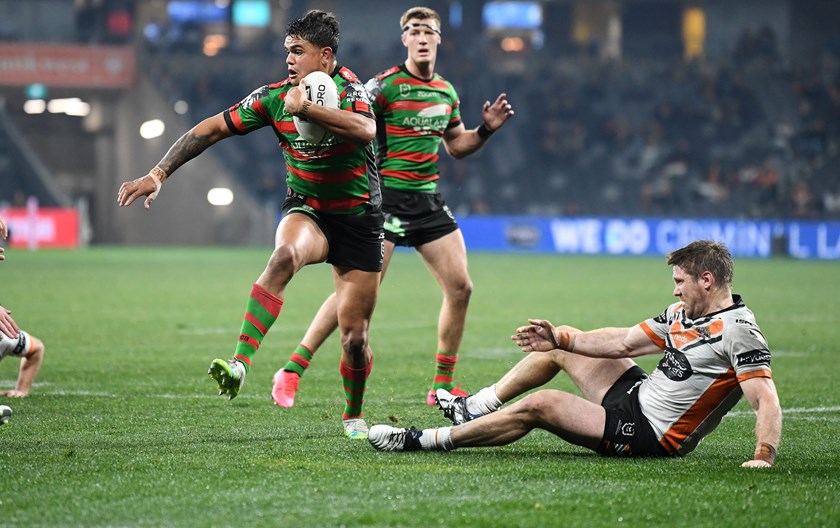
“I was proud of him. It takes a strong person to stand up against that. He draws a lot of courage from his culture – from home – and he wears his heart on his sleeve so it is good to see him being successful.
“We have seen with [AFL great] Adam Goodes, how much of a toll it took on him. Not only was Latrell standing up for himself, he was standing up for other people who don’t have a voice and I think he was standing up against racism in general and vilification.”
With Mitchell moving to Souths this year and Ferguson (Parramatta) and Watson (Newcastle) leaving last season, the Roosters do not have any Indigenous players in their current squad but Touma said the club would celebrate its proud Indigenous history this week.
“I feel that our club does a really good job in that space and they are constantly looking at ways to promote Indigenous and Aboriginal culture, and make sure that it is at the forefront of everyone’s mind when they come to the club,” he said.
“Unfortunately I think there are wider social issues that we can’t hide from but as a game I think we do a really good job with tolerance and acceptance, not only of Indigenous people but all walks of life.
“We are all drawn to rugby league by the love of the game, the mateship and black, white or indifferent, if you are willing to get out there and put the jersey on, there is an appreciation and a bond that is there forever.”
The views in this article do not necessarily express the opinions of the NRL, ARLC, NRL clubs or state associations.

